Nina MacLaughlin's Blog, page 13
November 13, 2016
What we talk about when we talk about rage
Since Tuesday night, what keeps rising like a burn blister
on the surface of my brain is all the times I’ve been told you’re being sensitive. All the times I’ve been told you’re taking things too seriously, too personally. All the times
I’ve been told, you’ve had every
privilege, what are you complaining about? All the times I’ve been told to shhhhhh. All the times I’ve been told to
take it easy.
I cannot shake these voices and I cannot shake the feeling
they provoke.
There’s a cauldron that exists inside me that starts to
seethe when these sorts of things are said, when I am being dismissed, quieted,
condescended to. And when the fire under this cauldron is lit, to a white
hotness that is nearly blinding, what it takes with it is my ability to be the
articulate and intelligent person I know myself to be. Something else takes
over, a pre-lingual fury, a heat that erases logic and coherent
argument and civility. In these moments, the experience is not just my own self
being demeaned or silenced; it is the entire history of women being demeaned or
silenced. And the weight of that, the condensed and hot feeling of outrage is,
at times, more than I know how to deal with, and certainly, in these moments,
more than I know how to rightly express. What goes is the impulse to kindly and
gently explain something. What comes is a wanting to smash faces. If it were a
sound, it would be a scream so loud it would make birds fall out of the sky.
This is rage. It is a feeling of blood in the cheeks, heart
bumping in the throat, whatever pocket that holds tears getting filled up
behind the eyes ready to spill, it is a stuttering, frenzied horrible, horrible
feeling. It comes from the helplessness of knowing: I cannot make you understand. You will never, never know. Like
approaching a smooth white wall that rises forever that you cannot penetrate,
that you cannot climb over to reach the other side, a maddening, impenetrable
stop.
This is rage, and I am finding myself wanting to admit that
it is in me. It is not attractive. It ranks as one of the very worst things I
know I can feel. It is scary. It frightens
people. It makes them uncomfortable.
But I have been made to feel uncomfortable. Every woman I
know has been made to feel uncomfortable. In ways subtle that grind like a dull
file across a piece of wood, in ways explicit like an unasked for touch from a
stranger. And right now I feel uncomfortable, and that cauldron is simmering
and I do not want it to cool. As ugly and frightening as it is. Because there
are things uglier and more frightening. The poet Mary Ruefle writes “Anger is
an emotion that is produced by fear. There are no exceptions.”
There are no exceptions. This is rage. And this is fear. And
I feel afraid. That suddenly there is increased license for the type of
silencing, demeaning, assaulting that erases a person’s personhood.
For a long time I thought it went without saying that I
support the safety and rights of people of color, of the LGBT community, of
Muslims, of immigrants, of women, of every disenfranchised group trying to stay
safe and have a voice. Doesn’t that just fucking go without saying? No. No. It doesn’t. Not right now. And I was wrong to think it went without saying before. So I say it. I am behind you. I am so
behind you. We have each other’s backs. And I hope I never see anyone being
silenced, insulted, demeaned, assaulted. And if I do I will come to your aid as
I hope you would come to mine.
In a much-read piece from the New York Review of Books, Masha Gessen writes rules for surviving
an autocracy. The whole piece is worth your time, but this section in
particular has been echoing in my head:
Rule #4 Be outraged … In the face
of the impulse to normalize, it is essential to maintain one’s capacity for
shock. This will lead people to call you unreasonable and hysterical, and to
accuse you of overreacting. It is no fun to be the only hysterical person in
the room. Prepare yourself.
Prepare yourself. Prepare yourself. I cannot stop hearing it.
Prepare yourself.
Take it easy. No. I
can’t. And won’t.
Prepare yourself.
September 29, 2016
Up on a ladder, high up on a ladder against a house on a
hill, I...

Up on a ladder, high up on a ladder against a house on a
hill, I was hammering shingles, and the tiny old woman who lives nextdoor,
climbed the stairs to her front door and said to me, “Oh, you are working hard.
Don’t you feel afraid up there?”
She is small with a cloud of blonde-white hair all around
her head. She could be eighty. She could be a hundred and eight.
“I try not to think about it,” I said, a big smile on my
face.
“Are you my new neighbor?” she asked.
“No, no,” I said, “just working here.”
“Well,” she said, “you are working hard, and my name is Lily
if you need anything.”
“Thank you,” I said. “I’m Nina.”
“Nina!,” she said. “You say your name is Nina?”
“Yes,” I said.
She put her hand over her heart. “I have a sister Nina,” she said.
“Well, it’s Ninotchka, but everyone calls her Nina, because who wants to be
Russian.” She had such warmth in her eyes. “Nina,” she said. “If you need
anything, you come. I am always here. You just come, love,” she said.
And I nearly fell off the ladder for joy.
September 20, 2016
A month before this summer started, I drove to my hometown
to...
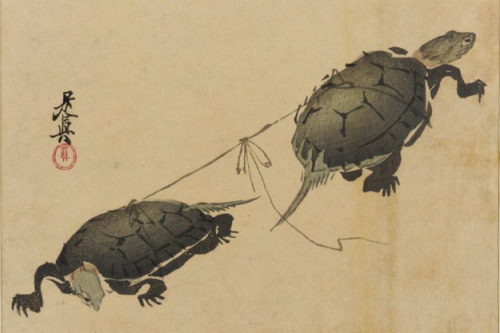
A month before this summer started, I drove to my hometown
to run on roads I ran on when I was young, to trade my usual route on city
streets for hills, stone walls, wide barns, farmhouses, cows there munching
grass, empty fields. A warm, soft day, and I was feeling fine, air in and out
of my lungs, feeling well carried by the muscles in my legs, ponytail at swish
across my shoulders. Some miles in, near a vernal pond, a turtle had been
crushed, freshly so, run over by a car. I stopped to look. Flipped upside down,
the base of its shell was smooth, amber colored, and cracked. The under rim of
its top shell was striped with red, and the red of its blood on the road was a
red shocking in its aliveness. I crouched to get a better look. A small pile of
its guts, propelled out of its body, lay shining a few inches away, coiled like
a little heap of earthworms.
I am no haruspex, no augur. I cannot read the future in the
splay of viscera across the cratered cement of a suburban back road. I crouched
by this small dead thing on a day in the lead up to summer when the world was on
the verge of bursting, emerging in its lush summer dress like a girl coming
down the stairs in a gown. I crouched by the turtle and a car or two sped by
and I wondered, is this what normal people do?
Guts on the road and there’s no telling what will happen,
and here again we’re back to talk of what it is to be at home with question
marks, the struggle of not getting crushed and cracked open by the press of
immediate need. It’s hard knowing what you want because in it there’s the risk
you might not get it.
This morning, at the bottom of my bag, I found a slip of
paper, a fortune from a fortune cookie. You
have both a lot of ideas and the energy to put them into action. I do not
remember seeing this before. I have no idea where it came from. But I am
grateful for the timing of its appearance.
Done examining the turtle, I rose, continued on my run.
Before my heartrate had a chance to rise again, another chance for
prognostication, this time in the form of a frog who’d also been flattened by a
car, the entirety of its guts squeezed out of its mouth. Poor small friends,
crushed when the world was warming again, on the move when the season was new.
The risk of wanting, the risk of waking up to change. There were these two, the
future in the angle of their intestines, and what I can see from it now, what
those guts tell me now: there were others I couldn’t see, ones who’d made it
safe across the street, to live and thrive in the face of all the risks.
[Two Turtles by Shibata Zeshin]
September 13, 2016
In an essay called “Making House” in last Sunday’s New...
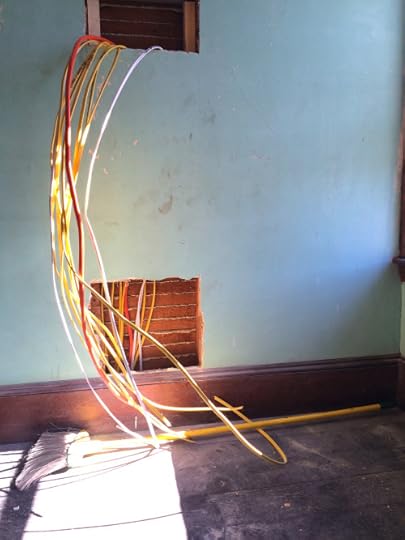
In an essay called “Making House” in last Sunday’s New York
Times Magazine, Rachel Cusk admits to be driven to the “brink of mental and
physical collapse” by the renovation of the London flat where she lives with
her daughters. “I caused walls to be knocked down and floors to be ripped up
and rooms to be gutted … with what at times seemed like magic and at others
sheer violence.”
Magic and violence. It’s a combination of conditions that
resonates right now. The magic and violence of a dismantling. The magic and
violence of having the way you’ve understood things get altered, of someone
coming in and shifting things so they are, for a time, unrecognizable, altered,
messy, stirred up, all upside-downed.
We’re at work on two big projects – taking down walls,
ripping up floors, gutting, gutting. It is a trauma, I think, for the house,
for the inhabitants. The physical and psychic disruption is acute. In
Somerville, we’ve destroyed a room to rebuild it into an enormous kitchen. The young
couple and their daughter, five years old, have no kitchen right now. A fridge
is tucked into a hall; there are mugs on the rim of the tub. The home becomes
something else, surrendered, for a time, to chaos, to dust, to horrific noise,
to strangers clomping up the back stairs with tools hanging from their waists.
This winter, we worked extending a small house in Cambridge.
The couple joked the experience nearly ended in divorce. They laughed when they
said it, but there was desperation in the air when we stood in front of the
sink and asked them, which side do you
want the dishwasher on. Not another decision. Not another compromise, pro
and con list, weighing of preferences. Exhaustion was written all over their
faces.
“To all except anguish, the mind soon adjusts,” Emily
Dickinson wrote in a letter. And so maybe one gets used to washing the mugs in the tub,
to the deafening screech of the saws. In between the hammerbangs last
week, in between the ear-pierce of the saw screaming through another plank of
two-by-eight, I could hear, on the other side of the plastic we’d hung from the
door, the mother teaching her five year old the alphabet.
The magic and the violence hold the promise, or, at very
least, the possibility, the potential, that it will, in time, come to feel like
home.
August 23, 2016
The ghosts live behind the walls. They live in the space
between...

The ghosts live behind the walls. They live in the space
between the ceiling and the floor. That’s where some of them live. A place
feels fine, regular, then the walls get bashed. That surface gets removed, tossed
out windows; dust swells, floats, falls, coats everything (floor, throat, stairs,
my hair), and a new space is exposed, dark and splintery, and the energy of the
room shifts. Not every house, of course. But this one, for sure.
I met a cat recently who maybe is actually a witch. I mostly
detest cats, for their haughtiness. This one had a ferocity in her eyes that
made it tricky to be in the same room. I lost a staring contest with her and
felt, in the aftermath, that engaging in it put me under a curse. I should’ve
known better. I admired the creature, and feared it.
There’s power in strange places these days. In between old
joists above the head, in the space between old studs in a stretch of wall
that’s just been opened, light touching places untouched for a century or more.
In the fierce eyes of a cat. On a sand dune which swells and shifts and
presents itself wide to the sky. Do you buy it? That once something is opened
up, things get altered, new energies swirl, enough that it registers as a buzz
in the blood? It’s August and the breeze is drying and the shadows are
shifting. Light finds its way in, even into windowless rooms.
August 22, 2016
The day started badly and got worse. Last week, for no...
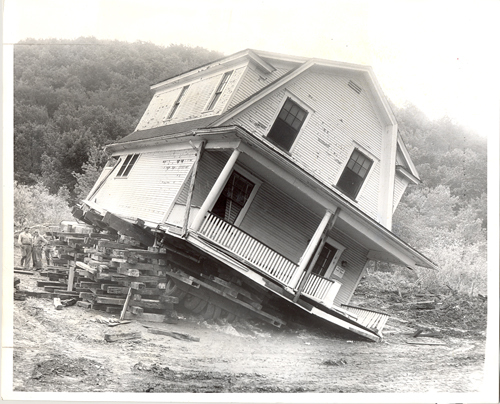
The day started badly and got worse. Last week, for no good
reason except sometimes days go wrong, we struggled through each hour. Cuts
were off. Corners were sloppy. Nothing was level, plumb unachievable.
Instructions were misunderstood. Jokes weren’t landing. This summer, we’ve had
the help of a twenty-three-year-old kid from Washington State. He reminds me of
the freshman from Dazed and Confused,
the long-haired one who’s always pinching the bridge of his nose. He and I
stood looking at the landing we were framing outside, feeling tired and mad and
dumb.
“We’re tilting,” he said. I looked at him, thinking maybe he
was talking about the state of our small deck. “Do
you know that phrase?” he asked. I said I did not. “It’s from gaming,” he said.
“It’s when you start to fail, and because you’re failing, you keep failing, and
keep getting more frustrated, and that makes you fail even harder, and mistakes
just bring on other mistakes. That’s tilting.”
It was just the right encapsulation of the day. “Blind
leading the blind here today,” M. said when she joined us outside. “I mean,
what the fuck happened here?” she said, looking at the way four pieces of
two-by-six came together at a corner, none of them flush. We stood at the
corner and looked. And we all started laughing, dying laughing, because sometimes
days go so bad, and sometimes there’s no other reaction to be had, except to
fix it, which we did. “You know tomorrow will be better,” M. said. Which is
always the comfort. The next day is always better. And she was right. In the
first two hours of the next day, we got more done than the whole previous eight, tilting no longer, but upright, and on.
[Image from the Times Tribune Archives, on the building of the Pen-Can Highway, June 3, 1960]
August 16, 2016
Last night, my brother and I played catch in the street for
almost two hours. We hucked the football...
Last night, my brother and I played catch in the street for
almost two hours. We hucked the football back and forth. We talked and laughed.
Last night was my brother’s last night in Cambridge. About
an hour ago, I watched and waved as he and his wife drove away in a loaded U-Haul, headed
towards Missouri and a graduate program in creative writing that his wife will
start this fall.
Last summer, when things had gone so bad, my brother said to
me, ‘there’s an apartment opening up in my building, you should take a look.’ I
did. On a humid morning, I spent eight minutes looking at the place, and with
my hands shaking and tears welling, I wrote a check and signed a lease. It
meant the end of a six-year long relationship. It meant the start of some new
phase. The fact was: I needed rescuing. The fact was: I needed someone to throw
me a life preserver. I didn’t realize how much then, and it’s a hard thing to
admit, but I see it now. I see it now. In saying, hey, there’s this place, maybe you should
live here, my brother saved me.
“Isn’t it strange,” someone said to me recently, an only
child, incidentally, “to live in the same building as your sibling?”
“No,” I said. “It’s not strange. It’s really nice.”
The Mediterranean diet – all that fish and olive oil, all
those eggplants and red wine – has long been credited for the longevity of
Italians. But it turns out it’s only part about the food. They live in
proximity with their family; they take care of each other; they share meals and
conversation. It’s this, too, it’s been shown, that propels them deep into old
age. And it rings true. Weeks would go by when I wouldn’t see my brother, each
of us involved in our own lives and pursuits, but the comfort knowing he was
nearby was profound, and I’m only realizing how much so now, now that his place
has been emptied and he’s on I-90 heading west.
Last night we threw the football back and forth. We talked
about his nerves and his excitement about this move. We talked about our
parents and our great younger brother. We talked about old flames and nostalgias, about Kings
Quest IV, depression, friends, and love. The light began to disintegrate and
the crickets got loud. We tossed the football back and forth on our short
street near the Charles River, trying not to hit the parked cars, the
powerlines. His new river will be the Mississippi. That feels exciting.
I feel excited for him, for them, for the thrilling process
of the unfamiliar becoming familiar. I feel grateful and lucky and sad.
Last month, on the night of the Full Buck Moon, I went
outside to get a look. And at the same time, my brother and his wife appeared
on the sidewalk, and we all looked together at the big white brightness. What a
nice thing, to bump into your brother and his wife on a sidewalk to look at the
moon. What a nice thing, to throw a football in the street as light fades.
“My arm hurts.”
“Mine too.”
“You want to keep playing?”
“Yeah.”
August 13, 2016
The Eldridge Tide and Pilot Book is like a Farmers’ Almanac
for...
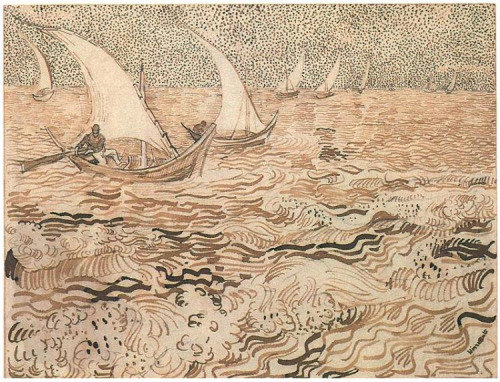
The Eldridge Tide and Pilot Book is like a Farmers’ Almanac
for East Coast sailors. An annual guide, it’s full of tables, charts, and lists
of lighthouses, buoys, currents, tides. Short articles and stories discuss
maritime history, nautical astronomy, fishing tips. Its cover is every year an
unmistakable yellow, a yellow that speaks to a beam of light through fog, of the
first lick of sun rising over the horizon. I’ve heard my friend Jenny, who
recently took helm of the book along with her husband Peter, describe the color of an old farmhouse as
Eldridge yellow.
I spent some hours yesterday helping Jenny with the book. We
sat at her dining room table as fans hummed and a tired air conditioner clicked
and cooled in the window. Her two dogs lay splayed, bellies up, on pillows
nearby, and her small daughter ate cantaloupe in the kitchen with a sitter.
Hottest day of summer so far, and you could feel the heat accumulating outside.
I don’t know much about the ocean. I swim in it, poorly,
enthusiastically. It is, as a close friend said the other night on the phone, a
guaranteed re-setter: impossible to see it, be in it, and not be altered for it.
Last summer, which was so bad, I would go north to the beach and sit and watch the
water move. The waves don’t care, I
thought and felt, and it was one of the few things that helped get me through. The waves don’t care. Sweat, tears, and
the sea: I’m a believer in those cures.
Jenny read times outloud, of moonrises and moonsets, of
sunrises and sunsets, and I verified that what she read from the official
government listings matched up with the version I had in front of me. I felt
the days lengthen and shorten as we moved through the months. I saw the moon swell
and vanish. The way light moves across the year! It felt like secret knowledge,
ancient, sacred. Grounding and thrilling at once. The way it feels to grow a
tomato, maybe, or have a sense of which way the wind blows. To hold this guide
is to feel in possession of something powerful, essential, and true. Shifting
planets, the sun’s sweep across the sky, the rise and fall of seas – it’s
possible to find our way by the stars, this yellow book reminds us. Lie easy
with the tide, and the waves will bring you home.
[Vincent van Gogh, Fishing Boats]
August 10, 2016
On a damp day last week, I spent seven hours digging a hole.
It...

On a damp day last week, I spent seven hours digging a hole.
It was, at the end, eighteen inches wide and four feet down to get below the
frost line so ice won’t pitch the posts of the porch we’re building on the back
of a house on a hill. Typically, it would be a morning’s work, if that. But
there were roots and rocks and the earth was clay, hard-packed, and stubborn.
And I had stayed up late the night before, was blurred
around the edges, feeling calm, dismantled. A hole, for my fuzzed and reeling
head, was the best I could hope for – away from the screams and sharp spinning blades of the
saws. So simple: here is the earth, make some of it go away.
“Nice hole,” one of the demo guys winked at me as he filled
up the doorway before returning to his louder, dirtier work inside chipping
away at a chimney that was being removed from the house in a process like
closing up a throat. I smiled, blushed, he laughed and wiped soot across his
forehead and thumped back to the bricks.
Four feet is a surprising depth, when you stand over the
hole and look down into the earth. It makes you think of:
Treasure
Tunnels
Creatures that burrow
Creatures that see in the dark
Escaping
Darkness
Water
China
Graves
Opening
Opening
Opening
July 25, 2016
Before and after. The back of the house faced the south. We...

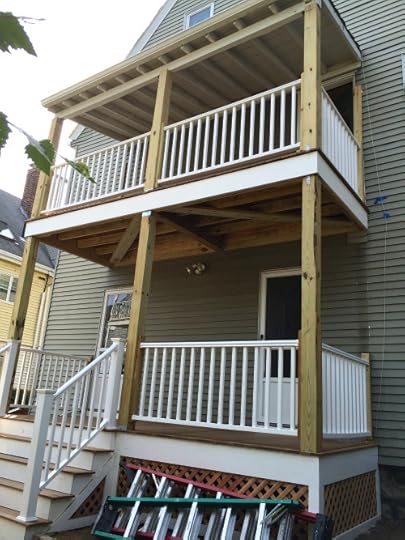
Before and after. The back of the house faced the south. We worked daylong in
the sun, sweating as it described its arc across the sky above this
double-decker in Arlington. The tomatoes got fatter during our two weeks
building these decks, and when the woman who owned the place came out to her
gardens, the smell of basil – that dense, licoricey smell of high summer –
lingered in the air and won, temporarily, against the smell of the sunscreen
and sawdust that coated our skin.



